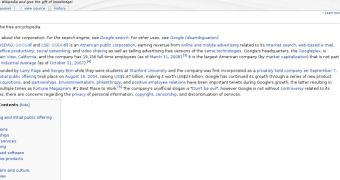Wikipedia, most probably your favorite online encyclopedia, receives most of its traffic from Google. While this might not be completely unexpected, it is now a certainty with the recent release of study made by Nielsen Online. The online encyclopedia draws all but 10 percent of its traffic from search engines and other sites, but with the majority coming from Google.
Wikipedia was launched in 2001 by Jimmy Wales and Larry Sanger as a non-profit open content encyclopedia. According to their own website, "as of April 2008, Wikipedia attracts 683 million visitors annually", which should provide you with a general image about the total traffic of this particular online encyclopedia. Wikipedia is recognized as a true follower of the Web 2.0 concept. The project was also faced with serious criticism, as it has been said that the information available on the site aren't accurate in nature and susceptible to vandalism.
The reason why Wikipedia receives most of its traffic from search engines led by Google is that the website is seen as a valuable resource of information, as also stated by Michael Pond, media analyst for Nielsen Online. In the last five yeas, the only encyclopedia website has seen a growth of nearly 8,000 percent, making the site's traffic level comparable to popular websites like YouTube and MySpace. Some of the site's traffic also comes from various blogs, as its content is used to explain various concepts.
Beside the 61 percent of visitors at home being redirected from to Google, Wikipedia also receives visits from Yahoo's search engine. The 19 percent of visitors at home places Yahoo second to Google's search engine. Microsoft and AOL's search engines total less of 10 percent of the traffic Wikipedia registers in the US.
The traffic being redirected to Wikipedia from Google is going to increase, as Google has recently featured its Google Maps product with links to Google for various locations.

 14 DAY TRIAL //
14 DAY TRIAL //